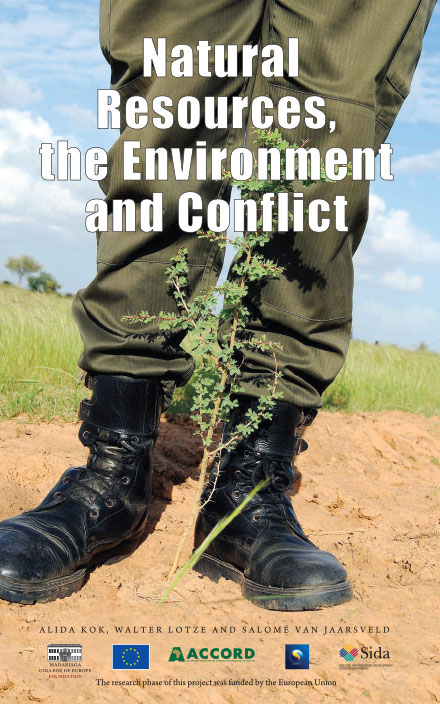
This report emanates from an exploratory study conducted in 2009 by the African Centre for the Constructive Resolution of Disputes (ACCORD), in collaboration with the Madariaga-College of Europe Foundation. With a focus on Burundi, the Democratic Republic of the Congo (DRC) and Sudan, the study solicited views and perspectives on the role that natural resources and the environment can play in complex conflict situations.
As part of the exploratory study, ACCORD carried out desktop research and interviews with representatives of civil society organisations (CSOs), non-governmental organisations (NGOs) and international institutions in March and April 2009. While this report does not aim to capture all the outcomes from those discussions, salient aspects, informed by the results of the desktop research, have been included. Finally, this exploratory investigation was the first phase of an ACCORD research project on natural resources and conflicts. As such, the report focuses only on key concerns, emphasising specific issues that are part of a complex and widely researched problem.
A large proportion of Africans are dependent on natural resources and the environment to subsist. The natural environment is the foundation of livelihoods based on subsistence and commercial farming, animal husbandry, trade and mining. These activities are inextricably linked to the availability of natural resources and the sustainable management of those resources. Factors such as population growth, human movements, current and future land scarcity, rising levels of global consumption and consumerism, climate change and political and social instability all impact on the natural environment and, thereby, on livelihoods. In turn, the allocation, management and exploitation of increasingly limited natural resources can contribute to conflict in Africa.
In reviewing the exploratory study and preparing this report, ACCORD observed five main challenges. The challenges relate first to the problem of natural resources and the environment in complex conflict situations, and second, to the actors that can play a constructive role in natural resource, environmental and conflict management.
- Conflict management: Increasingly, conflict management approaches should take the environment and natural resources into account when attempting to prevent violent conflict from erupting; negotiating and implementing durable peace agreements; deploying peace support operations; and establishing preventative and post-conflict peacebuilding mechanisms.
- A lack of viable alternatives: Environmental changes and inequalities in the global economy are not solely responsible for resource exploitation or direct causes of conflict. Rather, it is the lack of alternatives for those reliant on the natural environment for their livelihoods and/or for power and wealth that can contribute to conflict.
- Conflict-sensitive natural resource and environmental planning: Relating to the first challenge, the absence of long-term strategic conflict-sensitive planning – which takes E into account creeping vulnerabilities and assesses their negative impact on livelihoods and conflicts – undermines future conflict management and peacebuilding.
- Government and civil society: The interdependent role of government and civil society actors in environmental and natural resource governance is vital for the equitable management of natural resources, environmental protection and strengthening sustainable livelihoods.
- External actors: Neighbouring states, multinational companies (MNCs) and other non-state actors involved in illegal extraction of resources can benefit from – and consequently, contribute to – the perpetuation of chaotic conflict situations.
Finally, the report concludes with observations about renewable and non-renewable resources and environmental factors.

